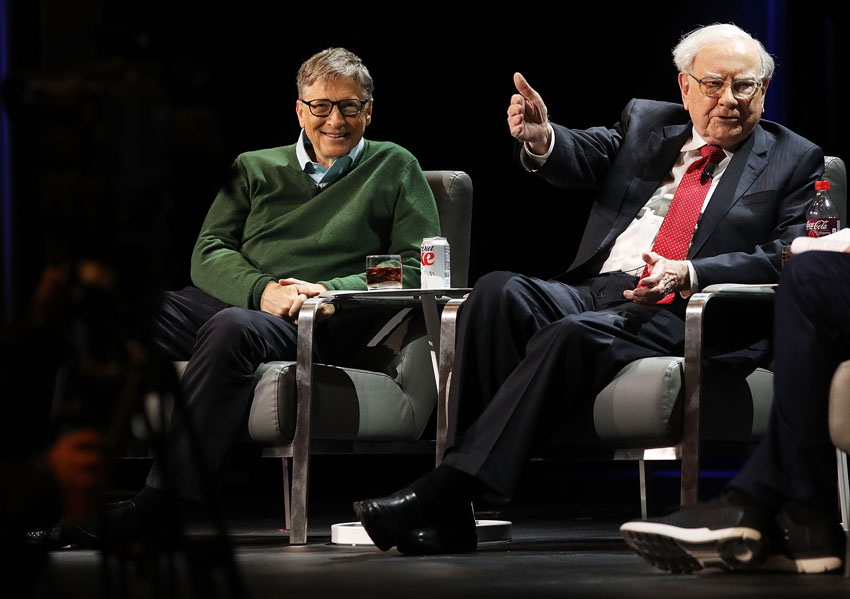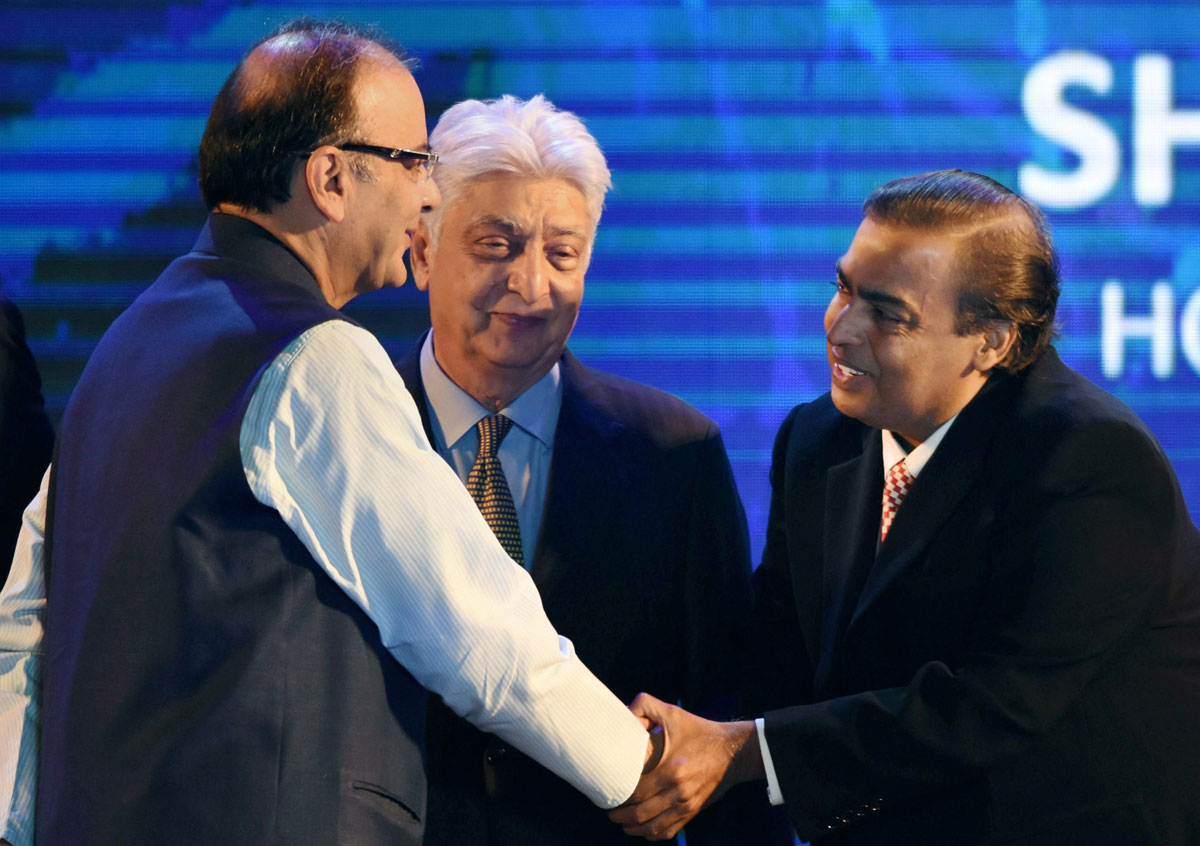Stark Rise In India’s Rich-Poor Divide as the Country Becomes Second Most Ill-matched Economy
File photo of Indian Finance Minister Arun Jaitley as he shakes hands with Reliance Industries chairman Mukesh Ambani as Wipro Chairman Azim Premji looks on during the launch of Digital India Week in New Delhi, in 2015. (Manvender Vashist /PTI)
India is the second most ill-matched or unequal economy of the world as revealed by a recent study titled “An Economy for the 99%” conducted by rights group Oxfam, writes Priyanka Bhardwaj. – @Siliconeer #Siliconeer #India #Economy #SocialDivide #RichPoorDisparity @NaMo #NaMo @Narendramodi #NarendraModi
The report talks of figures that clearly state that the country’s richest 1 percent own 58 percent of its total wealth which is at $3.1 trillion.
In other words, just about 57 Indian billionaires have same amount of wealth or $216 billion as that of the bottom 70 percent population and a total of 84 billionaires hold $248 billion, and in terms of wealth the first three in the pecking order are Mukesh Ambani (with $19.3 billion), Dilip Shanghvi ($16.7 billion) and Azim Premji ($15 billion).
On the global scale there are eight billionaires who hold the same amount of wealth as the poorest 50 percent of the world’s population.
Of the total global wealth pegged at $255.7 trillion, Bill Gates owns $75 billion, Amancio Ortega $67 billion and Warren Buffett $60.8 billion.
Based on these figures the report advocates the establishment of a human economy that secures and profits one and all and not just the handful elite.
Thereby it draws attention to the astonishing reality that just 1 percent own more wealth than the rest of the humans on this Earth.
Quoting Swiss global financial services company, UBS estimates the report highlights that that in the coming two decades about 500 people will be passing on their $2.1 trillion worth of wealth to their heirs — larger than the Gross Domestic Product of India, a South Asian economic home to 1.3 billion people.
Juxtaposed with previous studies it may be safe to conclude that the wealth of the poor had always been grossly over-reported.
The truth is that in the last two decades only the richest 10 percent of the population in Asian economies such as China, Indonesia, Laos, India, Bangladesh and Sri Lanka had witnessed more than 15 percent increase in their incomes while the poorest 10 percent had seen more than 15 percent shrink in their incomes.
That the rich hold the wealth at the cost of poor is evident from the figure that the CEO of India’s top information technology company takes home more than 416 times the salary of an average employee in the firm, while over 1,200 million people or 27 percent of the country’s population suffers below poverty line.
Talking of inclusive development, recently the World Economic Forum’s Inclusive Development Index had ranked India at a dismal 60th position among 79 developing countries.
Another vital conclusion of the Oxfam report is the gender hue to the rich-poor divide — women’s earnings stand at 70-90 percent of men’s due to various discriminations and being relegated to low paying sectors.
Even as more than 40 percent of the 400 million women living in rural India engage in agriculture and related activities, they remain unrecognized as farmers and are not owners of land, and this limits their access to government schemes and credit, thus compromising their agricultural productivity.
The huge gender wage disparity afflicting India is also underscored in the “Global Wage Report 2016-17” of the Indian Labor Organization that talks of women constituting 60 percent of the lowest paid wage labor and only 15 percent of the highest wage-earners.
As one reflects on the denial of wealth to large sections of India who do not have “the competence or cleverness” to earn money like the super rich, one is reminded of Mahatma Gandhi saying, “There is enough for everyone’s need but not for everyone’s greed.”

Though an ideal welfare state or society may not be reality, from the point of view of fair and equitable governance there needs to be investigations into disproportionate profiteering and taxation of the rich, by way of progressive taxation system rather than the current regressive one could be another means to distribute wealth to deprived sections.
Contrary to popular beliefs the super-rich are not necessarily “self-made” as more than half the world’s billionaires either inherited their wealth or accumulated it through industries subject to corruption and cronyism.
For far too long government policies have only enabled income and wealth to be sucked upwards rather than trickling down, and at an alarming rate.
Liberalization and opening of Indian markets in the early 1990s resulted in an explosion in inequality as opportunities were created in a few high-end sectors such as banking, IT, telecom and airlines that employed the highly-skilled and educated while agriculture or labor-intensive manufacturing went on the decline.
Nor were there adequate expends on proper, basic education and health so that the poor could also be co-sharers of “India Rising.”
In the recent demonetization of high value currencies it was the lowest earning segments that suffered the maximum shocks.
Recently the International Monetary Fund had warned that India faces the social risk of growing inequality as it evaluated the country’s Gini coefficient to have shot up from 45 percent in 1990 to 51 percent by 2013 due to rising inequality between urban and rural areas, and even within urban areas.
The Oxfam report makes a grim prediction that the current unacceptable state of affairs if unchecked would result in many seismic political changes.
Oxfam International Executive Director Winnie Byanyima categorically stated in a press interview, “It is obscene for so much wealth to be held in the hands of so few when 1 in 10 people survive on less than $2 a day. Inequality is trapping hundreds of millions in poverty; it is fracturing our societies and undermining democracy.”
Talking of redressal mechanisms to this unequal nature of economy Bill Gates who has pledged a certain proportion of their wealth to charitable causes agrees that charity alone may not be a substitute for adequate and fair taxation.
Going by French economist, Thomas Piketty’s suggestion a wealth tax could be charged at 1.5 percent which in turn could be ploughed back into health and education.
Celebrated writer, poet and lyricist Javed Akhtar notes that the only minority in India or the world is the “rich and privileged few.”
As holders of wealth and capacities to influence and shape policies, the privileged section needs to heed these reports, not just for the sake of humanity but also for their survival.


